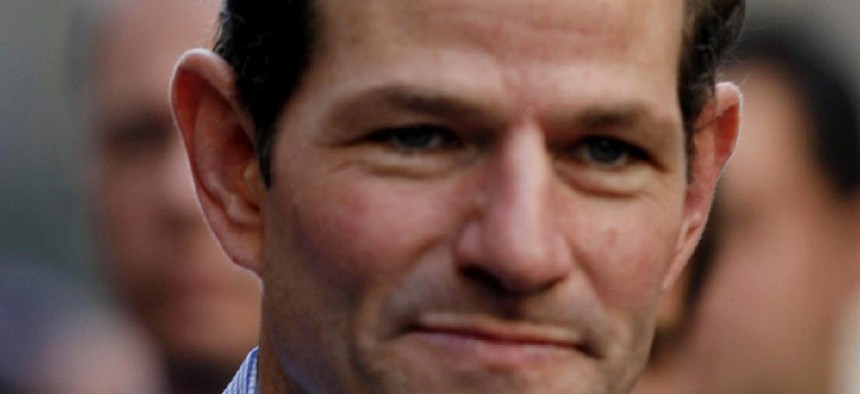In a Crisis, Be Like Eliot Spitzer, Not Anthony Weiner
Lessons from recent history about the wrong way, and the right way, to handle a crisis.
In Masters of Disaster: The Ten Commandments of Damage Control, authors Chris Lehane, Mark Fabiani, and Bill Guttentag provide case studies that explore the right and wrong way to respond to crises.
WRONG WAY:
BP, which downplayed the environmental impact of the 2010 Gulf of Mexico oil spill. "BP's damage control only increased the harm the company was doing to itself. And the company's tactics led to the erosion of trust. While BP had virtually unlimited funds as well as the full menu of 21st-century cutting-edge communications tactics and tools, it was lacking a fundamental understanding that spin alone cannot build trust -- and that spin that is not accurate can, in fact, do more harm than good."
Research In Motion, whose response to BlackBerry network outages "provides a cautionary tale for those who think that hiding in a closet and hoping that the storm will pass is the best way to handle a crisis." The verdict: "Instead of the RIM CEO stepping up and immediately accepting responsibility for the problem, the company lamely said that everyone at RIM was busy working full-time on a fix. Instead of taking to social media to explain what went wrong and what was being done to fix the problem and prevent it from occurring again, the company stayed quiet. And when the CEO did finally appear several days into the outage, his apology was widely ridiculed and rejected as too little too late."
Former Rep. Anthony Weiner, who posted "close-up photos of him in his Jockey underwear, from the waist down and knees up." The verdict: "An abject apology along with the acceptance of full responsibility in the opening days of the crisis -- even if multiple news cycles went by before it was provided -- would have afforded Congressman Weiner the best shot at remaining in Congress. Instead, by chasing the story, he put out inaccurate information that did even more harm and, in doing so, lost the war for control of the story. And he lost his seat in Congress."
Tiger Woods, the superstar golfer who waited three months into a career-altering sex scandal to publicly acknowledge his failings and take full responsibility. "Those in crisis need to gather themselves, get the real story together, and then tell the story -- even if it takes time to do so (so long as they are not putting out inaccurate representations during the interregnum). Ultimately, whether you do it immediately or wait several days, you will still end up effectively being in front of the story if you put the whole story out in one fell swoop."
RIGHT WAY:
Kobe Bryant, the superstar basketball player who was accused of rape. "Immediately after his arrest, Bryant held a public event where, standing beside his wife, he acknowledged his relationship with the woman and apologized to his spouse for the infidelity, but maintained that the sex was consensual. This immediate public disclosure by Bryant -- where he faced the media, admitted to sex with his accuser, and took responsibility for what happened -- allowed him to get in front of the story. Bryant established his credibility, which, in turn, served as the decisive pivot point by which to raise questions about the nature of the woman's rape claim."
Steve Jobs, who faced customer complaints about the flawed antenna placement in its iPhone4. "Steve Jobs addressed the problem directly, although at first haltingly, but Jobs and Apple finally presented and swiftly implemented a comprehensive solution involving the distribution of free iPhone cases that corrected the problem. In the end, the issue became nothing more than a minor speed bump on the iPhone's high-speed race to smart-phone dominance."
Eliot Spitzer, who resigned as New York governor amid a prostitution scandal, taking responsibility for his actions and apologizing. "At every step in his finely tuned comeback, Eliot Spitzer sought to attach himself to issues that cast him in a positive light while simultaneously always being forthright about his accountability and offering apologies for his personal conduct."
Tylenol, which set the standard for damage control after seven people died in 1982 from taking Tylenol pills laced with cyanide. The company immediately told the public what it knew and didn't know about the deaths, and took proactive steps to ensure public safety. "While few individuals or organizations will ever face a life-and-death situation as serious as the Tylenol case, many will face an equivalent Tylenol moment when their very future is at stake. And such a Tylenol moment demands putting in place an approach that understands: Communicating accurate information is the coin of the realm.
(RELATED: Tips for Surviving Reply-All and Other Crises, From Bill Clinton's 'Masters of Disaster')
Image via stocklight/Shutterstock.com




